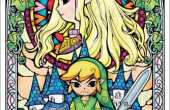Piper CJ
Piper CJ: M.A. Folklore, Commander of the Normandy, contracted digital media guru helping with the new age of archiving during the day and a full-time RPGer by night.
Contributor I
- Plebian Penman
- Lurker
- Pssst
- Sharp-Eyed Citizen
- Town Watch
- 8-bit Hero
- ?
- Articles
3 - Featured
3 - Comments
19
- Ext. Comments
10 - Processed
18 - Revisions
12
- Topics
7 - Topics Taken
4 - Notes
14
- Topics Proc.
9 - Topics Rev.
2
- Points
647 - Rank
180 - Score
376
Latest Articles
Latest Topics
Nostalgia as a GenreIn the three days after its Netflix release, "Stranger Things" rocketed to number 26 IMDB's top 250 shows. Marketed across the internet as a well-casted, spooky, nostalgia-perfect program, the description inspired a cross-internet search for movies, television shows, and assorted media that has been marketed for its "nostalgic" value and their close ties to the 80s and 90s. The majority of the hits were produced in the past 20-30 years (Clueless, Grease), but many instead are recent productions taking place in that time period (It Follows, Stranger Things), falling into decades not old enough to be considered "period pieces" but also clearly not modern age. Examine this category of film and television, its cultural appeal, its widespread success across the western world, and determine whether or not "nostalgia" is being appropriately applied to these very specific decades, or how media of these categories might be alternatively described.
|
Published | Tattoos as ArtFrom traditional Folklife tattooing to the evolving methods and styles of tattooing (watercolor, biomechanical, pixels, dot work), tattoos are the unsung contributions to the world of art. In 2013, Buzzfeed compiled a listicle of 13 brilliant tattooists who are contributing to the new artistic stylings: (link) The Smithsonian Center of Folklife and Cultural Heritage held a 2012 exhibit on tattoos, and the New York Times profiled a 2013 Highbrow Ink exhibit regarding the artistry of tattoos. In what ways do tattoos conform to artistic norms and practices, and in what ways are they still regarded as culturally inferior expressions of art? Examine the bias (and growing acceptance) to tattoo culture, and draw parallels to how similar bias existed regarding modern art, living art, and various other forms artistic expression throughout history.
|
Mainstream AcceptanceWhat are the benefits and drawbacks of a genre or franchise gaining mainstream acceptance? For instance: in what ways does Marvel benefit from being mainstream? How does grossing popularity damage Star Wars (or does it?). How does the MCU gain artistically from its mainstream appeal? What sacrifices must it make? Are the monetary benefits worth the trade of artistic integrity? A game writer might focus on the social benefits gamers receive from the de-stigmatizing of video games vs. the "selling out" of catering to the main stream. The writer of this article could focus on any medium of entertainment, from television and movies to games, examining both privilege and hipster-esque shunning that comes with the main stream. While I've provided an overly-broad range of ideas for medium, the writer of this article would focus on only one aspect of entertainment (film; television; games), not all three.
|
Remaking High Culture: Popularizing ArtFrom "Romeo Juliet" to "Oh Brother Where Art Though", reworking classic stories like Shakespeare's "Romeo and Juliet" to Homer's "Iliad" and "Odyssey" with popular appeal is either a fun and creative on-taking or crass money grab, depending upon who you ask. Examine similar instances in film where classic plays and literature have been given a new breath and identity through popular appeal, modernized sets, and creative directing. Are there instances where this process has succeeded in maintaining the artistic integrity of the original work while making something visionary? Are there instances where this process was a disaster? Does this act successfully cater to a new generation, or is it pandering/talking down to an audience that would prefer authenticity?
|
Cross-Platform DevelopmentMovie adaptations of books is nothing new, but in this upcoming wave of entertainment we're seeing behemoth projects being applied to development. Patrick Rothfuss's "Kingkiller Chronicles" isn't the first, but may be one of the largest undertakings of the new trend of multi-platform/cross-platform development. In a statement from Lionsgate, who just won the rights to development: Is this beneficial as it enables fans and audiences to explore the story in ways that film alone could not? Is it a cash grab? What are the benefits and drawbacks of this new trend of development? |
Nerd Cred: The ChasmExplore the tensions between Table Top (think: Warhammer; D&D) and Live Action gamers and role players (fantasy real-world experience, think: your banker in a local park decked with with swords and cloaks). Why is one group often disparaging of the other? What credence does one community have for this divide? How often does overlap occur? Does this tension foster a stronger sense of one's own identity?
|
Subway Syndrome: The Drawbacks of ChoiceExplore a phenomenon I've dubbed "Subway Syndrome" (Yes, like the sandwich), as it relates to the choice-heavy model for gaming. Subway, Chipotle, and choose-your-own-ingredients restaurants give you so many options that you're bound to make a mistake. Add jalapeños and mustard to your tuna? Sure! Sounds great! Throw some ranch and honey on your tortilla soup. Eventually modification leads you to mistake and regret. "Why did I choose this? I should have gotten the BBQ. Why did I add this? I shouldn't have put so many weird flavors here." How does the potential for regret affect the multi-choice gaming model? In what ways does modification and the opportunity to customize your experience create drawbacks or detract from what could be a solid core/well-crafted story/canon/writing? How does it impact your experience as a user? Much has been said (even by me) of the benefits of choose-your-own adventure games. Can someone play Devil's Advocate? |
Latest Comments
| Graphics, Pixels, and the Art of Video Games | |
Thank you so much! | Graphics, Pixels, and the Art of Video Games |
I’ll leave that to the hard-hitting journalists. I don’t put my articles through the test of “will this make the world feel hopeless and change society” test. But I’d urge you to consider that sometimes what’s important is that which makes people want to stay alive in this bleak and terrible world, and value is found in that which makes us smile. | Graphics, Pixels, and the Art of Video Games |
Thank you for this insight, I absolutely agree with your parallels! | “Bro Games” and the Gamer Divide |
Well I *do* call myself a gamer, not because I’m a casual gamer but because it envelopes most of my personal time, a portion of my professional time, and steered my educational pursuits. So absolutely, the title isn’t for everyone, and no one needs a label, but if you feel like the shoe fits, wear it. | “Bro Games” and the Gamer Divide |
I’m going to have to disagree. I think your same logic could be applied to “Hipster” since the term has lost its original meaning and drifted from intent, yet the word still successfully conjures a specific image and communicates an idea, making it a successful term. “Gamer” may be broad, general and not accurate to its original definition, but the title functions in its ability to communicate an idea. | “Bro Games” and the Gamer Divide |
Thank you for your comment! It means a lot! And I tried to address that these are broad generalizations, but it’s definitely a phenomenon I (and people in my circle) feel and experience too, and which made it feel worth opening a dialogue. | “Bro Games” and the Gamer Divide |
There will always be exceptions to every rule, but if we never generalize we’ll never further knowledge, opinions or discussion. | “Bro Games” and the Gamer Divide |



Modern art is timeless? Duchamp’s “Urinal” is timeless? Tracey Emin’s “My Bed” Is timeless?
Nah, it can be art and be present and be relevant for today’s society.